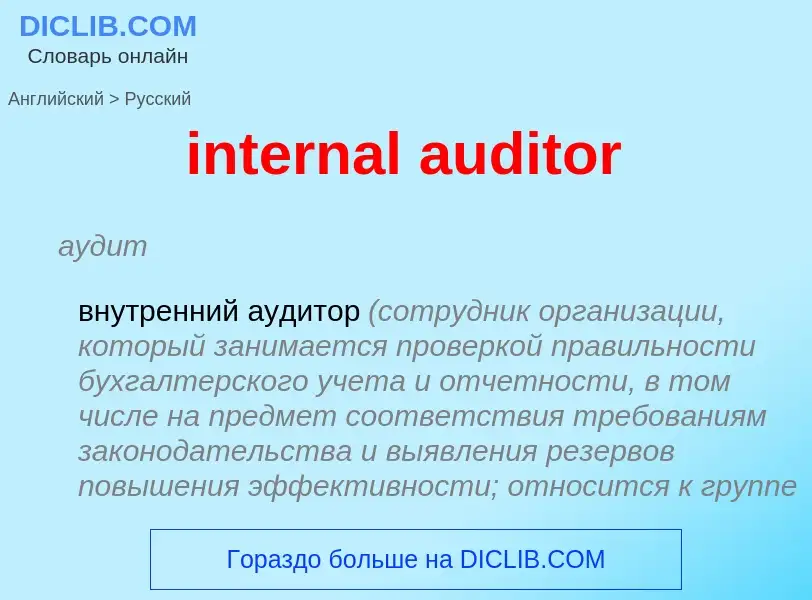Traduzione e analisi delle parole tramite l'intelligenza artificiale ChatGPT
In questa pagina puoi ottenere un'analisi dettagliata di una parola o frase, prodotta utilizzando la migliore tecnologia di intelligenza artificiale fino ad oggi:
- come viene usata la parola
- frequenza di utilizzo
- è usato più spesso nel discorso orale o scritto
- opzioni di traduzione delle parole
- esempi di utilizzo (varie frasi con traduzione)
- etimologia
internal auditor - traduzione in russo
аудит
внутренний аудитор (cотрудник организации, который занимается проверкой правильности бухгалтерского учета и отчетности, в том числе на предмет соответствия требованиям законодательства и выявления резервов повышения эффективности; относится к группе "бухгалтеры, аудиторы и родственные специальности")
управление
внутренний аудит (регулярная проверка бухгалтерских документов и всей деятельности компании ее сотрудниками (специальным подразделением) на предмет подтверждения правильности принятых решений, для выявления мошенничества, ошибок в деятельности и т. д.)
Wikipedia

Internal auditing is an independent, objective assurance and consulting activity designed to add value and improve an organization's operations. It helps an organization accomplish its objectives by bringing a systematic, disciplined approach to evaluate and improve the effectiveness of risk management, control and governance processes. Internal auditing might achieve this goal by providing insight and recommendations based on analyses and assessments of data and business processes. With commitment to integrity and accountability, internal auditing provides value to governing bodies and senior management as an objective source of independent advice. Professionals called internal auditors are employed by organizations to perform the internal auditing activity.
The scope of internal auditing within an organization may be broad and may involve topics such as an organization's governance, risk management and management controls over: efficiency/effectiveness of operations (including safeguarding of assets), the reliability of financial and management reporting, and compliance with laws and regulations. Internal auditing may also involve conducting proactive fraud audits to identify potentially fraudulent acts; participating in fraud investigations under the direction of fraud investigation professionals, and conducting post investigation fraud audits to identify control breakdowns and establish financial loss.
Internal auditors are not responsible for the execution of company activities; they advise management and the board of directors (or similar oversight body) regarding how to better execute their responsibilities. As a result of their broad scope of involvement, internal auditors may have a variety of higher educational and professional backgrounds.
The Institute of Internal Auditors (IIA) is the recognized international standard setting body for the internal audit profession and awards the Certified Internal Auditor designation internationally through rigorous written examination. Other designations are available in certain countries. In the United States the professional standards of the Institute of Internal Auditors have been codified in several states' statutes pertaining to the practice of internal auditing in government (New York State, Texas, and Florida being three examples). There are also a number of other international standard setting bodies.
Internal auditors work for government agencies (federal, state and local); for publicly traded companies; and for non-profit companies across all industries. Internal auditing departments are led by a chief audit executive (CAE) who generally reports to the audit committee of the board of directors, with administrative reporting to the chief executive officer (In the United States this reporting relationship is required by law for publicly traded companies).


